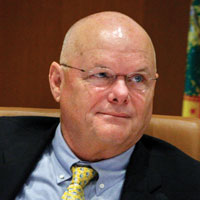
ON MONDAY, JANUARY 19, 2015, WE RECEIVED AN EMAIL FROM COUNTY COMMISSIONER BOB SOLARI alerting us that manipulation of the process of restructuring the Indian River Lagoon -National Estuary Program (IRL-NEP) was, in fact, corruption.
We agreed to meet and did so for two hours where he spoke philosophically about good government and then focused on the corruption by various state agencies related to the process of forming the new IRL-NEP, while providing me with two inches of documentation.
Here are his original comments, from his January 19 email, without any form of editing:
“When the English King James ll tried to manipulate parliamentary elections, Englishmen understood this as corruption and it was one of the reasons that James ll was deposed.
When colonial governors tried to manipulate various elections to some of the Colonial Assemblies, the Colonials understood this was a form of corruption of their representative system and it was one of the causes of the American Revolution.
Last Tuesday (January 13) the presentation I made about the process of forming a new IRL-NEP showed how the process was manipulated by the staff of various State of Florida Agencies. The Indian River County Board of County Commissioners understood that this was a form of corruption and voted 5-0 not to join the new IRL-NEP because it clearly undermined our form of Representative Democracy.”
(Please respond it you would like to receive a copy of Commissioner Solari’s presentation and we will have him send it to you.)
First, some research having to do with my meeting with Commissioner Solari:
In his book National Security and Double Government, Michael J. Glennan, a respected professor at Tuft’s Fletcher School, maintains that there is a “shadowy second government.”
While the first government is traditionally representative where “the people we vote for are perceived to wield power,” the second government are the people in Federal and State agencies “who actually move all the key levers.”
There are hundreds of Federal agencies, not to mention the number of State agencies. Jim Harper, Director of Information Policies told the DailyCaller that “no useful list of government agencies exist. The Government has no idea how many agencies it has.” (Source: Josh Peterson – 5/3/2013.)
Mr. Glennan argues that because the second government operates “so deeply in the shadows, these national security elites (Federal and State agencies), are largely unexamined by elected officials, at the cost of anything close to effective and restrictive oversight.”
Here is the issue: corruption occurs when an agency changes a policy from its original meaning. This is what Philip Hamburger, a Professor of Law at the Columbia University School of Law refers to as “administrative law.” He asks “is administrative law unlawful?”
Hamburger argues that “administrative law has returned American government and society to precisely the sort of of consolidated or absolute power that the US Constitution and constitutions in general were designed to prevent.” He believes modern constitutional law owes its lineage to claims of monarchial prerogative and civil law absolutism what were precisely the ideas that the American revolution was trying to reject.
Simple examples of administrative law are when congress passes a bill signed by the President having to do with “wetlands,” the Department of Environmental Protection can determine how to define them.
Another example of an agency changing a policy from its original intent is when Federal Judge Richard Leon ruled that a 2013 Housing and Urban Development Rule regarding disparate impact in Westchester County New York violated the 1968 Fair Housing Act.
Now back to Commissioner Solari and the Indian River County Commissioner’s 5-0 vote not to join the new IRL-NEP because it clearly “undermined our form of Representative Democracy.”
Indian River County Commissioner Bob Solari
In addition to achieving its goal of getting “buckets of money from State and Federal funds for new projects,” according to Commissioner Solari there was also the idea that the reorganized IRL-NEP would result in more local control. “My reading of the agreement to restructure the IRL-NEP tells me that rather than more local control, what local control there is will be significantly eroded.”
The first time the possibility of a reorganized IRL-NEP was on April 30, 2014 when at a IRL-NEP Advisory Board Meeting when Drew Bartlett, Deputy Director of the Florida Department of Environmental Protection asked the Advisory Board if he could “float an idea” on the agenda as to “whether the St. John’s Water Management District (SJWMD) should remain the IRL-NEP sponsor. Or if another form of sponsorship is appropriate.”
At a June 25, 2014 IRL-NEP Advisory Board meeting an Advisory Board subcommittee was formed. Commissioner Solari volunteered and was appointed to the subcommittee. The Advisory Board staff was directed to get certain information, including examples of the Mission Statements of other National Estuary Programs, which were never presented to the subcommittee.
The subcommittee only met twice, met for less than six hours and having been given six specific duties to evaluate and make recommendations on about the reorganized IRL-NEP, it was only able to discuss six of two items.
On April 18, 2014, 12 days before the IRL-NEP Advisory Meeting discussed that the IRL-NEP should be reorganized, SJRMD entered into a contract with Isaac Dean of Henry Dean & Associates, LLC with the objective that the reorganized IRL-DEP was “to replicate the Tampa Bay Estuary Program (TBEP) entity and operational format for the management of IRL-NEP, ideally with the entity having federal tax status such that private contributions to it may be deductible as charitable contributions under the Internal Revenue Code (IRC) section 170.”
Mr. Dean was paid $ 30,000.
In effect, the SJRMD, in collaboration with the South Florida Water Management District (SFWMD), also a member of Indian River National Estuary Program, knew in advance of the establishment of the Advisory Board subcommittee what the end-game was to be.
Then what was the purpose of the subcommittee, other than to make it look like there was representative government.
Commissioner Solari has no issue with replication of the Tampa Bay Estuary Program. His issue is the corruption that occurred in the process of reorganizing the IRL-NEP.
There is more to tell in a step-by-step sequence of events, including falsehoods, but this is an introduction as to why the County Commissioners voted 5-0 not to join the new IRL-NEP, “because it clearly undermined our form of Representative Democracy.”
